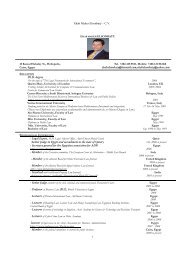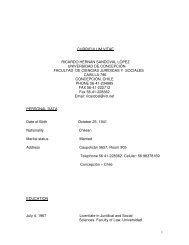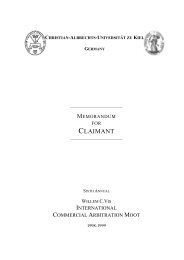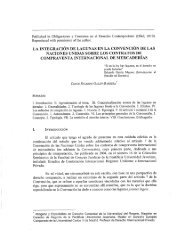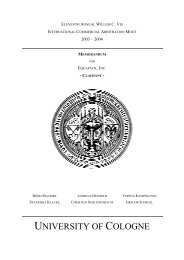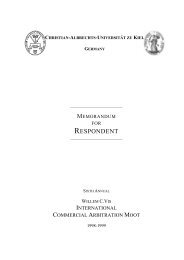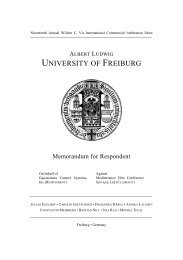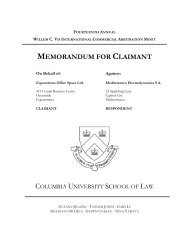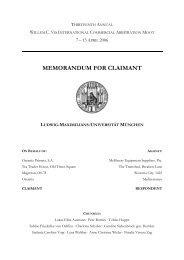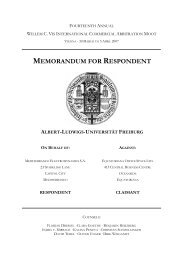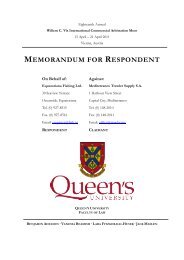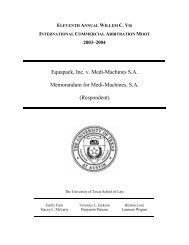memorandum for respondent ludwig-maximilians-universität münchen
memorandum for respondent ludwig-maximilians-universität münchen
memorandum for respondent ludwig-maximilians-universität münchen
Create successful ePaper yourself
Turn your PDF publications into a flip-book with our unique Google optimized e-Paper software.
LUDWIG-MAXIMILIANS-UNIVERSITÄT MÜNCHEN<br />
determining the applicable law (BERGER p. 498) by ensuring “a solution which is likely to be<br />
equally acceptable to both sides of the dispute” (BLESSING CONGRESS SERIES p. 411). Moreover,<br />
the cumulative approach guarantees that any country where the award might be en<strong>for</strong>ced will<br />
recognise the applicable law, since the choice is grounded on all conflict of law systems that are<br />
related to the action (DERAINS ARBITRAGE p. 121). In the present case, the cumulative<br />
application of the private international laws of Mediterraneo (Article 14 MED-PIL) and Oceania<br />
(Article 8 OC-PIL) lead to the same result, namely to the application of the MED-Law (see §§ 24-<br />
26 above).<br />
5. A Limitation Period of Two Years Is Appropriate in International Trade<br />
31 Contrary to CLAIMANT’s allegations that the MED-Law deviates from the minimum<br />
international standard on limitation (Cl. Memorandum §§ 97, 98), a prescription period of two years<br />
is appropriate in international trade. Businessmen have to calculate their expenses to make<br />
reasonable decisions about investment and expansion. It is thus unreasonable <strong>for</strong> them to have<br />
to reckon with the high financial risks of the outcome of disputes after a certain time (COESTER-<br />
WALTJEN p. 541; DIEDRICH p. 362 fn. 82). A short limitation period also promotes legal certainty,<br />
as obscured facts raise serious difficulties in bringing evidence (BOELE-WOELKI p. 2; DORSANEO<br />
§ 72.01).<br />
32 Furthermore, CLAIMANT can neither contend the four-year limitation period of the UN-<br />
Limitation Convention (Cl. Memorandum § 93), nor the three-year limitation period of the<br />
UNIDROIT Principles (Cl. Memorandum §§ 70, 96) to be appropriate in the present case. These<br />
bodies of law do not distinguish between different types of claims (Article 8 UN-Limitation<br />
Convention, Article 10.2 UNIDROIT Principles), which are usually subject to completely diverse<br />
lengths of prescription periods. In Italy, <strong>for</strong> example, the general limitation period is ten years<br />
(Article 2946 Codice Civile), whereas the period <strong>for</strong> claims arising out of sales contracts brought<br />
by the buyer against the seller is only one year (Article 1495 (3) Codice Civile). In Spain, the<br />
general prescription period amounts to fifteen years (Article 1964 Código Civil), while the period<br />
<strong>for</strong> sales contracts expires after only six months (Article 1490 Código Civil). These examples<br />
illustrate the inappropriateness of applying a uni<strong>for</strong>m limitation period irrespective of various<br />
types of claims. Consequently, the limitation periods of the UN-Limitation Convention and the<br />
UNIDROIT Principles should not be taken into account.<br />
33 Additionally, a two-year limitation period is appropriate in light of an international<br />
comparison. Danish, Swedish and Austrian Law provide <strong>for</strong> a prescription period of two years in<br />
case of a lack of con<strong>for</strong>mity of the goods (FREYER p. 167). The German Civil Code provides <strong>for</strong><br />
a general two-year period of limitation <strong>for</strong> claims out of contracts <strong>for</strong> the sale of movables after<br />
11



